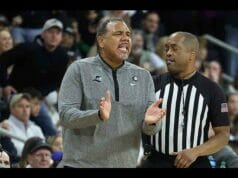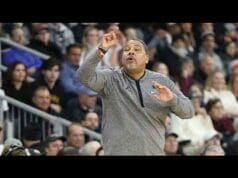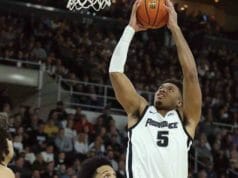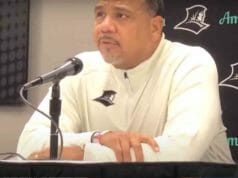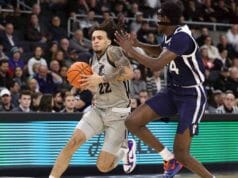So, the Providence Friars did it. After a week of rest and recuperation from injuries, tough outings, and a 7-3 record, the Friars overcame Stony Brook’s onslaught of 3-point shots to win their eighth game. The win came on a pair of last-second free throws from Rodney Bullock, who went 2-2 and sealed a 62-60 win.
On the one hand, winning these games is crucial no matter how it’s done. Taking a line from Gimli in Lord of the Rings, “that still only counts as one!” whether the Friars blew out Stony Brook by 90 or they won on another buzzer beater a la the game against Belmont.
Don’t give me this nonsense about Stony Brook this or that. Any win is a nice win! Nobody sees the Mona Lisa and says, “Nice painting, but I wish she was smiling.” #pcbb #cWo #gofriars
— Cooley World Order (@pcbbCWO) December 17, 2017
On the other hand, fans are (rightfully) starting to feel that these kinks the Friars were trying to work out in their November and early December games may not be kinks at all – it could just be who the Providence Friars are this year. Something is off with this year’s team, and it’s noticeable not just to the fans either.
Injuries a big factor, but something isn’t right. And the Big East is less than two weeks away. #pcbb https://t.co/3zVb6JARxU
— Jon Rothstein (@JonRothstein) December 18, 2017
There’s a lot to be said about winning. “Winning cures everything” and “winning is the only thing that matters” are both fairly relevant to this Providence team. Fans will be happy with W’s no matter how they’re acquired, but they do raise questions. And whether these narrow escapes are against Stony Brook or Duke, fans will eventually look beyond that. And for many, they already have.
Defining What’s Missing
In the past weeks there have been discussions around the fanbase about what the Friars are missing. Arguably, technical skills are lacking in some areas – the Friars struggle to score at the rim, they can go flat on offense, and their defense is more unaware than in years’ past.
For others, this may be a less tangible definition. You can point to the plays the coach is calling or the success rate of execution, but for many there appears to be something missing beneath the surface. Head Coach Ed Cooley has talked about it in press conferences, and fans have observed it. There’s some “it” factor that is missing – and that’s causing a lot of issues with on court performance, even if those performances have resulted in W’s.
FINAL | A tough battle on the road today. Yeboah led the way with his first double-double of the season finishing with 22 and 12. #AEHoops pic.twitter.com/SClgeIHo0e
— Stony Brook MBB (@StonyBrookMBB) December 17, 2017
This “it” factor has been discussed in a few terms: “grit”, “mental toughness”, “discipline”, “focus”, “confidence”, and “identity” all come to mind as things the Friars have been said to lack. The belief is that the Friars will perform much better if they have these things, and they don’t. But are all these ailments of a struggling team, or are they symptoms of a much larger problem?
I would argue the latter.
Right now, the problem isn’t that the team as a whole lacks one or two key “it” factor, it’s that they as a team aren’t playing as a cohesive unit because individuals are lacking different “it” factors. Part of the reason why fans have seen past Friar teams succeed under Cooley is because those teams played to individual strengths and worked together to help each other overcome individual weaknesses. They played as a collective unit to the point where individual weaknesses mattered but were mitigated by the support of each players’ teammates.
So, what’s missing? Easy: in my opinion, the Friars have not learned how to play as a collective unit. There’s a wedge that separates these teammates from playing successfully with one another. I’m not sure if I define it at the top with Cooley – I would personally observe this to be an on-court personnel issue. Fans, however, should be looking to Cooley to find a way to fix this problem – assuming this fix is possible this season. The reality is if this team can’t find a way to work together they will not overcome many games come conference play.
Tommy Sparkplug
I really don’t have much to say about Tom Planek getting minutes towards the end of the game against Stony Brook. Cooley has done this in the past (notably on the road against Butler a few years back) and it’s worked, and there’s no surprise that he did it again against Stony Brook. Cooley must be looking for something to get this team going, and walk on Tom Planek was the solution.
It did work. Planek contributed not necessarily from a stat perspective, but from a rally and win perspective. The Friars were on course to blow this game big time, and Planek’s presence proved to be the difference maker from an emotional standpoint. The players on the court immediately played tougher and more focused, and that ended up being the difference. I’m glad that he was able to get his minutes and help the Friars win.
If not for @tomplanek, Tom Brady would have had the best Sunday by an athlete named Tom. #pcbb
— Crispy Chris (@CrispyChris2) December 18, 2017
Freshman 15
Freshman Nate Watson and Makai Ashton-Langford continue to impress. Watson, who got his start against Stony Brook, is becoming more trustworthy on offense by the play, and as Ashton-Langford becomes more comfortable controlling the ball and driving to the hoop he’ll continue to convert on offense and make big plays when the Friars need it most. They will become the nucleus of a future Elite 8 Providence team, you heard it here first.
Dashing through the lane, and a free throw on the way. #And1 #GoFriars pic.twitter.com/EIDkvpX6Ce
— PC Men’s Basketball (@PCFriarsmbb) December 17, 2017
What fans need to be more patient on is Dajour Dickens. Every game it seems as though there’s questions about how Dickens can’t get a run, and the walk on got in before Dickens, and why won’t Cooley just play Dickens?
I’ve written about this in the past, but it’s been discussed enough to bear repeating: Dickens is not ready and will risk injury if he plays. It is better to have him on reserve as a “if everyone else is injured we’ll play him” option (hence no red shirt) but keep him benched and allow him to develop this year. Cooley is doing the wise thing by keeping that option open, but also knowing Dickens must develop physically first. This may worry some fans, who are still feeling the sting of losing Pascal Chukwu a few years ago after his freshman year because it was a lot of lost potential. Now, with a new big man on the roster and limited minutes, fans are worried about a repeat.
To that, it should be echoed that fans need to trust the process. Cooley knows what he’s doing, and he’s not keeping Dickens out of games for a bad reason. Dickens will develop and become a superstar for the Friars, but it will take time and that may mean time off the court and in the weight room/gym. Patience is never fun, but patience is a virtue and the way Ashton-Langford and Watson have both developed, that patience will hopefully pay off just as much with Dickens.


